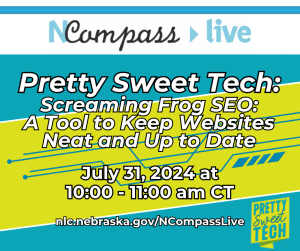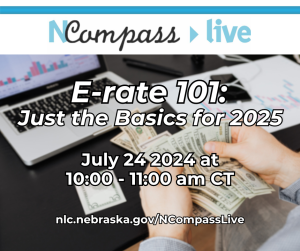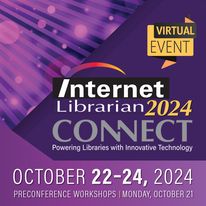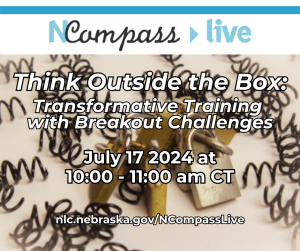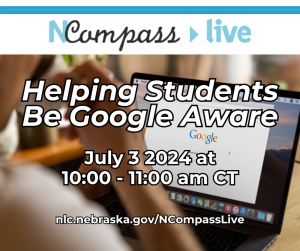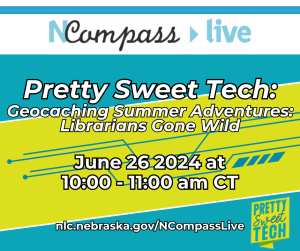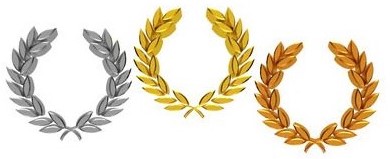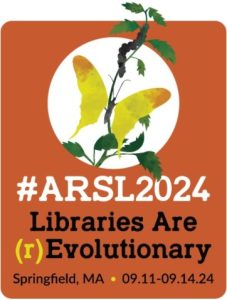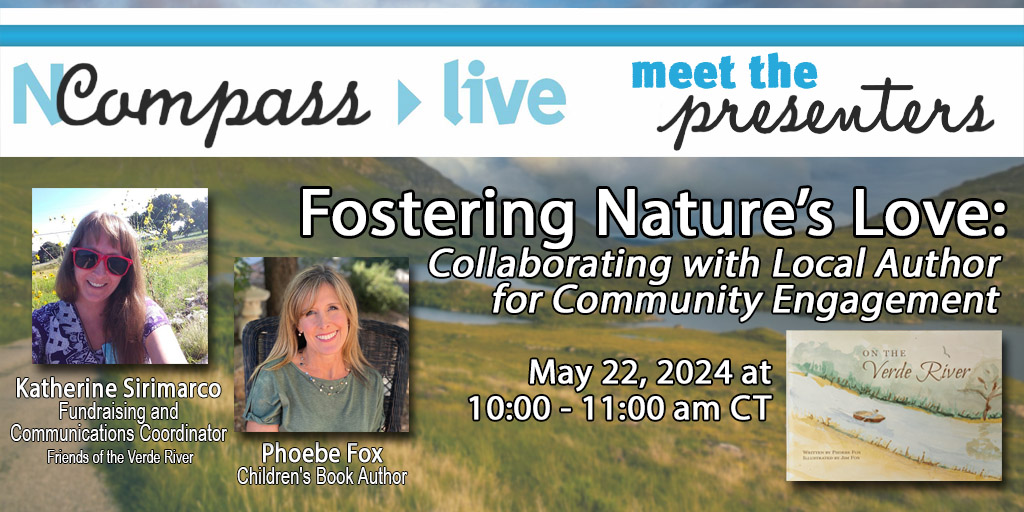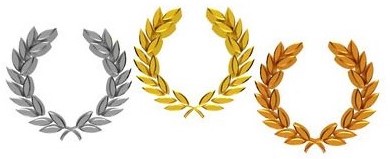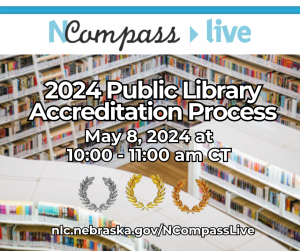Search the Blog
Categories
- Books & Reading
- Broadband Buzz
- Census
- Education & Training
- General
- Grants
- Information Resources
- Library Management
- Nebraska Center for the Book
- Nebraska Memories
- Now hiring @ your library
- Preservation
- Pretty Sweet Tech
- Programming
- Public Library Boards of Trustees
- Public Relations
- Talking Book & Braille Service (TBBS)
- Technology
- Uncategorized
- What's Up Doc / Govdocs
- Youth Services
Archives
Subscribe
Category Archives: Education & Training
NCompass Live: Pretty Sweet Tech: Screaming Frog SEO: A tool to keep websites neat and up to date
Learn how to use Screaming Frog SEO to keep your library website neat and up to date on next week’s NCompass Live webinar on Wednesday, July 31 at 10am CT.
Special monthly episodes of NCompass Live! Join the NLC’s Technology Innovation Librarian, Amanda Sweet, as she guides us through the world of library-related Pretty Sweet Tech.
Many years ago I stumbled across a tool called Screaming Frog SEO. It’s a free/ low-cost tool to keep your website and resource documents up to date, Google keyword-friendly, and just all-around awesome. It is code-free and easy to learn with plenty of tutorials. In this session you will see how Screaming Frog can help you:
- Check for broken links on your web pages for easy repair.
- Make sure all images on your website are accessible.
- Spell check and grammar check your whole website.
- Find out when pages were last updated.
- Other helpful tips and tricks.
As a fun fact, I found this tool because frogs are my favorite animal and I just wanted to see which website tools were frog-friendly. Now this is one of my most-used tools to update website and resource listings!
Upcoming NCompass Live shows:
- Aug. 7 – Learning New Technologies On-the-Fly: Vendorbrarian to Public Librarian
- Aug. 14 – Operating a Culture of Belonging: Personal Librarian 2.0
- Sept. 4 – Board Games & Computer Science in Libraries
To register for an NCompass Live show, or to listen to recordings of past shows, go to the NCompass Live webpage.
NCompass Live is broadcast live every Wednesday from 10am – 11am Central Time. Convert to your time zone on the Official U.S. Time website.
The show is presented online using the GoTo Webinar online meeting service. Before you attend a session, please see the NLC Online Sessions webpage for detailed information about GoTo Webinar, including system requirements, firewall permissions, and equipment requirements for computer speakers and microphones.
Posted in Education & Training, Pretty Sweet Tech, Technology
Tagged NCompLive, prettysweettech
Leave a comment
NCompass Live: E-rate 101: Just the Basics for 2025
What is E-rate? How can my library benefit from E-rate? How do I apply for E-rate? Find out on next week’s NCompass Live webinar, ‘E-rate 101: Just the Basics for 2025’ on Wednesday, July 24 at 10am CT.
E-rate is a federal program that provides discounts to schools and public libraries on the cost of their Internet Access and Connections to make these services more affordable. This includes Broadband, Fiber, and Wi-Fi Internet access as well as Internal Connections, such as wiring, routers, switches, and other network equipment. And new for 2025: off-premises use of Wi-Fi hotspots and wireless Internet services.
This session will be a general overview of the E-rate program. Full in-depth E-rate workshops will be held later in the year. It will be useful to libraries who have never applied for E-rate, libraries who are new to E-rate, and current E-rate libraries who just want a short refresher on what E-rate is all about.
IMPORTANT NOTE: The dates and rules in this session will be specific to E-rate Funding Year 2025.
Presenter: Christa Porter, Nebraska’s State E-rate Coordinator for Public Libraries, Nebraska Library Commission.
Upcoming NCompass Live shows:
- July 31 – Pretty Sweet Tech: Screaming Frog SEO: A tool to keep websites neat and up to date
- Aug. 7 – Learning New Technologies On-the-Fly: Vendorbrarian to Public Librarian
- Aug. 14 – Operating a Culture of Belonging: Personal Librarian 2.0
- Sept. 4 – Board Games & Computer Science in Libraries
To register for an NCompass Live show, or to listen to recordings of past shows, go to the NCompass Live webpage.
NCompass Live is broadcast live every Wednesday from 10am – 11am Central Time. Convert to your time zone on the Official U.S. Time website.
The show is presented online using the GoTo Webinar online meeting service. Before you attend a session, please see the NLC Online Sessions webpage for detailed information about GoTo Webinar, including system requirements, firewall permissions, and equipment requirements for computer speakers and microphones.
United for Libraries Virtual 2024: Statewide Registration
2024 United for Libraries Virtual: Trustees, Friends, Foundations
Tuesday July 30 – Thursday, August 1
There’s still time to register for the 2024 United for Libraries Virtual Conference! All Nebraska library directors/staff, Trustees/board members, and Friends of the Library and Foundation representatives receive FREE live registration – a value of $149 per person.
Registration includes live attendance and on-demand access to three full days of programming, keynote featuring author Eric Klinenberg, and the virtual Gala Author Tea. Individuals may attend any/all sessions live and/or watch on-demand.
This interactive three-day virtual event will feature expert speakers on current topics facing library Trustees, Friends, Foundations, and staff who work with them.
- Participate in live Q&A sessions with presenters
- Enjoy exclusive access to keynote speakers and authors
- Receive a certificate of attendance (for live participation or on-demand viewing)
Programming runs from 10:00 am CST to approximately 3:00 pm CST daily with scheduled breaks. Registrants may participate in some or all program sessions live, and/or watch recordings on-demand. (Sessions are also eligible for certification CE hours!)
Sessions include:
Tuesday, July 30th – Trustee Day
- “Rising to the Challenge: The Trustee’s Role in the ‘Culture Wars’”
- “Securing Tomorrow: Effective Succession Strategies for Library Boards”
- “Valuing Your Library: Beyond Cost-Benefit Analysis”
Wednesday, July 31st – Foundations & Fundraising Day
- “Donor Engagement: Acquiring and Inspiring Committed and Faithful Supporters”
- “Enhancing the Story – Developing a Smaller-Scale Capital Projects Fundraising Campaign”
- “Fundraising Tips and Tricks: Some Novel Ideas”
- “Marketing is the Future: How to Build a More Sustainable Library Foundation Model by Integrating Marketing in the Organizational Culture, Strategy, and Practice”
Thursday, August 1st – Friends Day
- “An Extravaganza of Literary Events for Your Library”
- “Championing Library Freedom: How Friends Groups Can Fight Back When Our Library is Under Attack”
- “Libraries are Better with Friends: How to Foster a Strong Group of Advocates”
- “Smooth Sailing with Library Trustees and Staff”
Registration Options
Choose *one* of the following options below to register for the virtual conference:
- Statewide Free Registration Form
- Submit the Statewide Free Registration Form
- Allow one business day for registration.
- Email United for Libraries
- Email united@ala.org
- Include your full name, email address, library, and primary library role
- Allow one business day for registration
- Bulk Registration
- Library Directors may email united@ala.org
- Include full names, email addresses, and primary library roles for each individual to register
- Allow two business days for registration.
If you have any questions, please contact Holli Duggan.
What’s Up Doc? New State Agency Publications at the Nebraska Library Commission
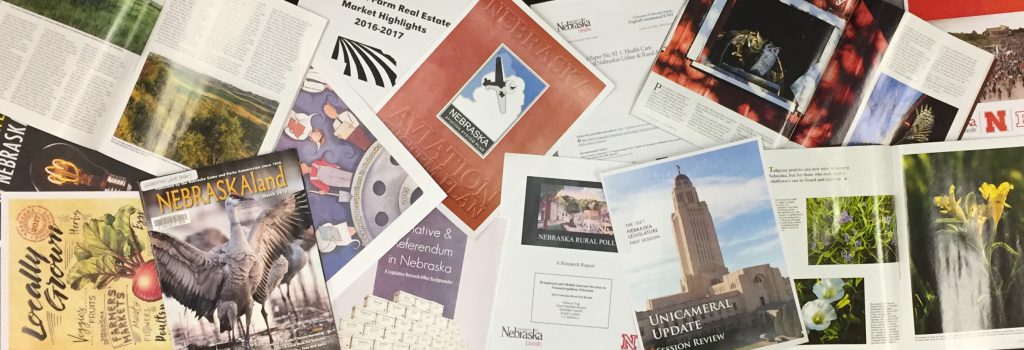
New state agency publications have been received at the Nebraska Library Commission for March through June, 2024. Included are reports from the Nebraska Auditor of Public Accounts, the Nebraska Department of Administrative Services, the Nebraska Equal Opportunity Commission, the Nebraska Department of Transportation, and the Nebraska Public Power District, to name a few.
Items are available for immediate viewing and printing by clicking directly in the .pdf below.
The Nebraska Legislature created the Nebraska Publications Clearinghouse in 1972 as a service of the Nebraska Library Commission. Its purpose is to collect, preserve, and provide access to all public information published by Nebraska state agencies. By law (State Statutes 51-411 to 51-413) all Nebraska state agencies are required to submit their published documents to the Clearinghouse. For more information, visit the Nebraska Publications Clearinghouse page, contact Mary Sauers, Government Information Services Librarian; or contact Bonnie Henzel, State Documents Staff Assistant.
Posted in Books & Reading, Education & Training, General, Information Resources, What's Up Doc / Govdocs
Tagged books, GovDocs, Reading
Leave a comment
Internet Librarian Connect 2024 Conference (Oct. 22-24)
The Nebraska Library Commission is pleased to offer a discount to all librarians in Nebraska who sign up for a Virtual Pass to attend the Internet Librarian Connect 2024 Conference.
This leading virtual conference on library technology allows librarians and information managers from all over the world an equal opportunity to be a part of an exciting conference in a time-efficient and cost-effective manner. Along with the flexibility of participating from anywhere, Internet Librarian Connect offers attendees the benefits of no travel costs, diverse content with the convenience of on-demand access, and global networking opportunities.
The Virtual Pass discounted rate is $199 (regularly $299). The Virtual Pass includes access to all keynotes and main conference sessions, networking, and the virtual exhibit hall. It also includes access to archived session recordings for viewing through December 31, 2024. (Does not include access to workshops unless purchased separately.)
This year the conference is being held virtually, from October 22 – 24, 2024. Detailed information about the conference can be found on the virtual event website now!
Full program details will be added to the Event Agenda in late July.
To receive the discount:
- Go to the Internet Librarian Connect 2024 registration link: https://site.pheedloop.com/event/ILC24/register#category
- Click on the Single Registration option.
- Complete the registration form, entering and applying the discount code 24NLC when prompted at checkout. Your discounted pricing should appear at this point.
Note: Your code will only work in the Single Registration option. The code isn’t needed when using the Team Registration.
Also, before registering, please be aware that sharing virtual access is not allowed. Each registration allows access for one person only.
Registration Questions:
Joan Weiss, Conference Registrar
jweiss@infotoday.com
General Inquiries:
Posted in Education & Training, Technology
Leave a comment
NCompass Live: Think Outside the Box: Transformative Training with Breakout Challenges
‘Think Outside the Box’ on next week’s NCompass Live webinar on Wednesday, July 17 at 10am CT.
You have all likely heard of breakout boxes. Join me to learn and discuss creative ways this tool can help make learning fun. These can be used for children and for adults, and the possibilities are endless. I will share what ideas I have explored, and it will be exciting to hear of any suggestions others have to offer!
Presenter: Tammi Thiem, Director, Three Rivers Library System, Omaha, NE.
Upcoming NCompass Live shows:
- July 31 – Pretty Sweet Tech
- Aug. 7 – Learning New Technologies On-the-Fly: Vendorbrarian to Public Librarian
- Aug. 14 – Operating a Culture of Belonging: Personal Librarian 2.0
To register for an NCompass Live show, or to listen to recordings of past shows, go to the NCompass Live webpage.
NCompass Live is broadcast live every Wednesday from 10am – 11am Central Time. Convert to your time zone on the Official U.S. Time website.
The show is presented online using the GoTo Webinar online meeting service. Before you attend a session, please see the NLC Online Sessions webpage for detailed information about GoTo Webinar, including system requirements, firewall permissions, and equipment requirements for computer speakers and microphones.
Book Briefs: New University of Nebraska Press Books at the Nebraska Publications Clearinghouse
Apologies that this installment of Book Briefs has taken so long–we have been without a cataloger since December 1st, 2023, but our new cataloger starts July 15th!
The Nebraska Publications Clearinghouse receives documents every month from all Nebraska state agencies, including the University of Nebraska Press (UNP). We normally post every two months, but today we are catching up with our backlog of the UNP books that the Clearinghouse has received.
UNP books, as well as all Nebraska state documents, are available for checkout by libraries and librarians for their patrons.
Here are the UNP books the Clearinghouse received in January through June, 2024:
Antilla, by Henrietta Goodman. Series: The Backwaters Prize in Poetry Honorable Mention
The title poem of this collection refers to the phantom island of Antillia, included on maps in the fifteenth century but later found not to exist. The ghosts that haunt this collection are phantom islands, moon lakes, lasers used to clean the caryatids at the Acropolis, earlier versions of the self, suicides, a madam from the Old West, petroleum, snapdragons, pets, ice apples, Casper, and a “resident ghost” who makes the domestic realm of “the cradle and the bed” uninhabitable. The ghosts are sons, fathers “asleep in front of the TV,” and a variety of exes—“lost boys” with names like The Texan and Mr. No More Cowboy Hat whom Henrietta Goodman treats with snarky wit but also with grief, guilt, and love.
Although memories pervade this collection, these poems also look forward and outward into a world where social inequality and environmental disaster meet the possibility of metamorphosis.
Boundless Deep, and Other Stories, by Gen Del Raye. Series: The Raz/Shumaker Prairie Schooner Book Prize in Fiction
Winner of the Raz/Shumaker Prairie Schooner Book Prize in Fiction, Boundless Deep, and Other Stories is a portrait of a family that holds together despite everything. By turns introspective, surreal, and bitingly funny, this collection of linked short stories spans seven decades across Japan and the United States and shows the tenacity of relationships fractured by language and distance.
At the funeral of her old boss, a grandmother confronts the legacy of the draft letters she delivered as a girl during World War II. Facing the loss of his job, a father becomes the caricature strangers have always believed him to be. A graduate student living far from home is worn down by the reality of what it takes to save even a small piece of the world. Along the way, we meet communist revolutionary Shigenobu Fusako hiding out in a Tokyo hotel, submariner and war criminal Nishina Sekio in his tortured dreams, and Edwin, a half-dolphin friend, wreaking havoc in a public pool. Written in the compressed style of Amy Hempel and Lucia Berlin, these stories examine characters whose struggles submerge them, weighing them down from every angle, until they can finally float free.
Brand Antarctica : How Global Consumer Culture Shapes Our Perceptions of the Ice Continent, by Hanne Elliot Fonss Nielsen. Series: Polar Studies
Antarctica is, and has always been, very much “for sale.” Whales, seals, and ice have all been marketed as valuable commodities, but so have the stories of explorers. The modern media industry developed in parallel with land-based Antarctic exploration, and early expedition leaders needed publicity to generate support for their endeavors. Their lectures, narratives, photographs, and films were essentially advertisements for their adventures. At the same time, popular media began to use the newly encountered continent to draw attention to commercial products. These advertisements both trace the commercialization of Antarctica and reveal how commercial settings have shaped the dominant imaginaries of the place.
By contextualizing and analyzing Antarctic advertisements from the late nineteenth century to the present, Brand Antarctica identifies five key framings of the South Polar continent: a place for heroes, a place of extremity, a place of purity, a place to protect, and a place that transforms. Demonstrating how these conceptual framings of Antarctica in turn circulate through our culture, Hanne Elliot Fønss Nielsen challenges common assumptions about Antarctica’s past and present, encouraging readers to rethink their own relationship with the Far South.
Bribed With Our Own Money : Federal Abuse of American Indian Funds in the Termination Era, by David R. M. Beck. Series: New Visions in Native American and Indigenous Studies
In Bribed with Our Own Money David R. M. Beck analyzes the successes and failures of Indigenous nations’ opposition to federal policy in the 1950s and 1960s. Focusing on case studies from six Native nations, Beck recounts how the U.S. government coerced American Indian nations to accept termination of their political relationship with the United States by threatening to withhold money that belonged to the tribes.
Termination was the continuation—and, federal officials hoped, the culmination—of more than a century of policy initiatives intended to end the political relationship between Indian tribal nations and the federal government. Termination was also intended to assimilate American Indian individuals into the country’s social and economic culture and to remove the remainder of reservation lands from federal trust. American Indians hoped to gain greater opportunities of self-governance and self-determination, but they wanted to do so under the protection of the federal trust relationship.
Bribed with Our Own Money analyzes both successful and unsuccessful efforts of Native nations to oppose this policy within the larger context of long-standing federal abuse of tribal funds. It is the first book to view federal termination efforts grounded in bribery for what they were: a form of coercion.
Buffalo Bill and the Mormans, by Brent M. Rogers.
In this never-before-told history of Buffalo Bill and the Mormons, Brent M. Rogers presents the intersections in the epic histories of William F. “Buffalo Bill” Cody and the Latter-day Saints from 1846 through 1917. In Cody’s autobiography he claimed to have been a member of the U.S. Army wagon train that was burned by the Saints during the Utah War of 1857–58. Less than twenty years later he began his stage career and gained notoriety by performing anti-Mormon dramas. By early 1900 he actively recruited Latter-day Saints to help build infrastructure and encourage growth in the region surrounding his town of Cody, Wyoming.
In Buffalo Bill and the Mormons Rogers unravels this history and the fascinating trajectory that took America’s most famous celebrity from foe to friend of the Latter-day Saints. In doing so, the book demonstrates how the evolving relationship between Cody and the Latter-day Saints can help readers better understand the political and cultural perceptions of Mormons and the American West.
Creative Genius : The Art of the Nebraska Capitol, by Susanne Shore, Kevin Moser, and Drew Davies.
Few buildings reveal truths, inspire greatness, and narrate the creation of humanity. Creative Genius: The Art of the Nebraska Capitol documents such a place. The Nebraska Capitol—once called “a peak in the history of building accomplishment”—breaks the boundaries of architecture and art.
Creative Genius unveils new images of the art of the Capitol in striking detail. Included are some of the greatest works by some of America’s most recognized artists and visionaries.
Along with remarkable visuals, Creative Genius delivers insights into the extraordinary stories and vision behind the art. Steeped in history and lore, the building narrates the creation of the universe and life, as well as the epic journey of the peoples of Nebraska. This book reveals the themes driving the art, chronicles the stories behind artists and their creations, and celebrates the beauty embodied in this influential building.
Ethics at the Center : Jewish Theory and Practice for Living a Moral Life, by Elliot N. Dorff. Series: A JPS Scholar of Distinction Book
Ethics at the Center culls the best of Rabbi Elliot N. Dorff’s pioneering thinking in Jewish ethics over nearly five decades. Dorff shows that our response to moral issues depends ultimately on our conceptions of the nature of human beings and God; how Jewish law, theology, prayer, history, and community should also define and motivate Jewish responses to moral issues; and how the honorable and divergent stances of Western philosophy and other religions about moral living shed light on Judaism’s distinctive standpoints.
From there Dorff applies Judaism’s ethics to real life: abortion post–Roe v. Wade, sexual orientation and human dignity, avoiding harm in communication, playing violent or defamatory video games, modern war ethics, handling donations of ill-gotten gain after the fact. In conclusion he explores how Jewish family and community, holidays and rituals, theology, study, and law have moral import as well.
Dorff’s personal introduction to each chapter reflects on why and when he wrote its contents, its continuing relevance, and if—and if so, how—he would now change what he wrote earlier. Readers will experience not only his evolving ethical thought but many facets of the person and the Jew that Dorff is today.
Exile and the Jews : Literature, History, and Identity, Edited by Nancy E. Berg and Marc Saperstein. Series: JPS Anthologies of Jewish Thought
This first comprehensive anthology examining Jewish responses to exile from the biblical period to our modern day gathers texts from all genres of Jewish literary creativity to explore how the realities and interpretations of exile have shaped Judaism, Jewish politics, and individual Jewish identity for millennia. Ordered along multiple arcs—from universal to particular, collective to individual, and mythic-symbolic to prosaic everyday living—the chapters present different facets of exile: as human condition, in history and life, in holiday rituals, in language, as penance and atonement, as internalized experience, in relation to the Divine Presence, and more. By illuminating the multidimensional nature of “exile”—political, philosophical, religious, psychological, and mythological—widely divergent evaluations of Jewish life in the Diaspora emerge. The word “exile” and its Hebrew equivalent, galut, evoke darkness, bleakness—and yet the condition offers spiritual renewal and engenders great expressions of Jewish cultural creativity: the Babylonian Talmud, medieval Jewish philosophy, golden age poetry, and modern Jewish literature.
Exile and the Jews will engage students, academics, and general readers in contemplating immigration, displacement, evolving identity, and more.
Forget I Told You This : A Novel, by Hilary Zaid. Series: Zero Street Fiction
Amy Black, a queer single mother and an aspiring artist in love with calligraphy, dreams of a coveted artist’s residency at the world’s largest social media company, Q. One ink-black October night, when the power is out in the hills of Oakland, California, a stranger asks Amy to transcribe a love letter for him. When the stranger suddenly disappears, Amy’s search for the letter’s recipient leads her straight to Q and the most beautiful illuminated manuscript she has ever seen, the Codex Argentus, hidden away in Q’s Library of Books That Don’t Exist—and to a group of data privacy vigilantes who want her to burn Q to the ground.
Amy’s curiosity becomes her salvation, as she’s drawn closer and closer to the secret societies and crackpot philosophers that haunt the city’s abandoned warehouses and defunct train depots. All of it leads to an opportunity of a lifetime: an artist’s residency deep in the holographic halls of Q headquarters. It’s a dream come true—so long as she follows Q’s rules.
The Forsaken and the Dead : The Bass Reeves Trilogy, Book Three, by Sidney Thompson. Series: The Bass Reeves Trilogy Series
**Books 1 & 2 of the Bass Reeves Trilogy adapted for the Paramount+ miniseries Lawmen: Bass Reeves
2023 Foreword INDIES Finalist in Historical Fiction
National Indie Excellence Award Winner in Western Fiction
All heroes have fatal flaws and a moment of defining hubris, but few rise from the ashes to achieve greater heights. In 1884 Deputy U.S. Marshal Bass Reeves was arrested for murder and placed among his own prisoners in Hell on the Border, the infamous federal jail in Fort Smith, Arkansas. It was the single greatest setback of his illustrious career, but it wouldn’t be his last mistake or trial by fire.
In The Forsaken and the Dead we meet Reeves again. In the 1890s, past his prime, Reeves proceeds through the valleys and shadows of Indian and Oklahoma Territories. Despite his caution and innovations as a lawman and detective, his nation no longer seems a product of his own making—so much like his children and his marriage to Jennie. While a modern world implodes around him and demons from his past continue to haunt his present, he remains resolute in his faith that he can be a steady rider on a pale horse.
Forward Without Fear : Native Hawaiians and American Education in Territorial Hawai’i, 1900-1941, by Derek Taira. Series: Studies in Pacific Worlds
During Hawai‘i’s territorial period (1900–1959), Native Hawaiians resisted assimilation by refusing to replace Native culture, identity, and history with those of the United States. By actively participating in U.S. public schools, Hawaiians resisted the suppression of their language and culture, subjection to a foreign curriculum, and denial of their cultural heritage and history, which was critical for Hawai‘i’s political evolution within the manifest destiny of the United States.
In Forward without Fear Derek Taira reveals that many Native Hawaiians in the first forty years of the territorial period neither subscribed nor succumbed to public schools’ aggressive efforts to assimilate and Americanize them but instead engaged with American education to envision and support an alternate future, one in which they could exclude themselves from settler society to maintain their cultural distinctiveness and protect their Indigenous identity. Taira thus places great emphasis on how they would have understood their actions—as flexible and productive steps for securing their cultural sovereignty and safeguarding their future as Native Hawaiians—and reshapes historical understanding of this era as one solely focused on settler colonial domination, oppression, and elimination to a more balanced and optimistic narrative that identifies and highlights Indigenous endurance, resistance, and hopefulness.
The Franz Boas Papers, Volume 2 : Franz Boas, James Teit, and Early Twentieth-Century Salish Ethnology. 2 Volumes– Part 1: 1894-1913, and Part 2: 1914-1922, Edited by Angie Bain, John Haugen, et al. Series: Franz Boas Papers Documentary Edition
The Franz Boas Papers, Volume 2 explores the development of the ethnography of Salishan-speaking societies on the North American Plateau as revealed through the correspondence between Franz Boas and the Scottish-born James Teit, who married into an Interior Salish family and community and became fluent in the Nlaka’pamux language. The letters between Teit (1864–1922) and Boas (1858–1942) chronicle Teit’s varied career as an ethnographer, from shortly after his initial meeting with Boas in 1894 until Teit’s death at the age of fifty-eight. A postscript documents Boas’s contribution to Teit’s legacy through the posthumous publication of the manuscripts Teit left unfinished at his death.
Teit made significant contributions to ethnography and the history of southern British Columbia through his photography of the people with whom he worked, his contributions to ethnomusicology and ethnobotany, his anthologies of mythic narrative, and his collections of Interior Salish—primarily Nlaka’pamux—material culture. In addition to collaborating with Boas in the development of Interior Salish ethnography, between 1909 and 1922 Teit worked to support Indigenous groups in British Columbia who were seeking recognition of Aboriginal title and resolution of their outstanding land claims.
The Franz Boas Papers, Volume 2 meticulously tracks the impact of the differing career trajectories of Teit and Boas on the primary product of their collaboration—the initial development of the ethnography of societies speaking Interior Salish languages. This second volume of the Franz Boas Papers Documentary Edition is an essential primary source of archival materials for research libraries and for students and scholars of Northwest Coast and Interior Mountain West ethnohistory, Native American and Indigenous studies, history of anthropology, and modern U.S. history. It is also an essential source for Indigenous and settler descendant communities.
Let Our Bodies Change the Subject, by Jared Harel. Series: The Raz/Shumaker Prairie Schooner Book Prize in Poetry
National Jewish Book Award Finalist
Paterson Poetry Prize Finalist
Let Our Bodies Change the Subject is a poetry collection that dives headlong into the terrifying, wondrous, sleep-deprived existence of being a parent in twenty-first-century America. In clear, dynamic verses that disarm then strike, Jared Harél investigates our days through the keyhole of domesticity, through personal lyrics and cultural reckonings. Whether taking a family trip to Coney Island or simply showing his son snowflakes on Inauguration morning, Harél guides us toward moments of intimacy and understanding, humor and grief.
“I will try,” he admits, “to be better than myself, which is all/I’ve ever wanted and everything I need.” Winner of the Raz/Shumaker Prairie Schooner Book Prize in Poetry, Let Our Bodies Change the Subject is a secular prayer. Hoping against hope, Harél works to reconcile feelings of luck and loss, of living for joy while fearing the worst.
Loving the Dying, by Len Verwey. Series: African Poetry Book
Loving the Dying is a collection of poems on life’s different stages. Set against the backdrop of a conflicted society, Len Verwey looks at a person’s life from youth and growing up to aging and dying, considering what the ineluctable reality of death might imply about how we should think about our lives.
These are poems of uncertainty rather than certainty. The more overtly biographical ones end with as many questions as they start with, and there is often sympathy for the outsider or the marginalized voice. Varying in tone and complexity, Verwey’s poems focus on the tension between escapism and reality, truth and delusion (for individuals and societies), and the need to face death if we are to care for the aged and learn to understand the process of dying.
As in his first poetry collection, In a Language That You Know, Verwey continues his effort to understand the successes and failures of the South African post-apartheid journey, with both humor and some despair.
Marcias : Queer Cultures and State Violence in Argentina and Spain, 1942-1982, by Javier Fernandez-Galeano. Series: Engendering Latin America
In Maricas Javier Fernández-Galeano traces the erotic lives and legal battles of Argentine and Spanish gender- and sexually nonconforming people who carved out their own spaces in metropolitan and rural cultures between the 1940s and the 1980s. In both countries, agents of the state, judiciary, and medical communities employed “social danger” theory to measure individuals’ latent criminality, conflating sexual and gender nonconformity with legal transgression.
Argentine and Spanish queer and trans communities rejected this mode of external categorization. Drawing on Catholicism and camp cultures that stretched across the Atlantic, these communities constructed alternative models of identification that remediated state repression and sexual violence through the pursuit of the sublime, be it erotic, religious, or cultural. In this pursuit they drew ideological and iconographic material from the very institutions that were most antagonistic to their existence, including the Catholic Church, the military, and reactionary mass media. Maricas incorporates non-elite actors, including working-class and rural populations, recruits, prisoners, folk music fans, and defendants’ mothers, among others. The first English-language monograph on the history of twentieth-century state policies and queer cultures in Argentina and Spain, Maricas demonstrates the many ways queer communities and individuals in Argentina and Spain fought against violence, rejected pathologization, and contested imposed, denigrating categorization.
My Grandfather’s Altar : Five Generations of Lakota Holy Men, by Richard Moves Camp, edited by Simon J. Joseph. Series: American Indian Lives
Richard Moves Camp’s My Grandfather’s Altar is an oral-literary narrative account of five generations of Lakota religious tradition. Moves Camp is the great-great-grandson of Wóptuȟ’a (“Chips”), the holy man remembered for providing Crazy Horse with war medicines of power and protection. The Lakota remember the descendants of Wóptuȟ’a for their roles in preserving Lakota ceremonial traditions during the official prohibition period (1883–1934), when the U.S. Indian Religious Crimes Code outlawed Indian religious ceremonies with the threat of imprisonment.
Wóptuȟ’a, his two sons, James Moves Camp and Charles Horn Chips, his grandson Sam Moves Camp, and his great-great-grandson Richard Moves Camp all became well-respected Lakota spiritual leaders. My Grandfather’s Altar offers the rare opportunity to learn firsthand how one family’s descendants played a pivotal role in revitalizing Lakota religion in the twentieth century.
The Narrator : A Problem in Narrative Theory, by Sylvie Patron, translated by Catherine Porter. Series: Frontiers of Narrative
The narrator (the answer to the question “who speaks in the text?”) is a commonly used notion in teaching literature and in literary criticism, even though it is the object of an ongoing debate in narrative theory. Do all fictional narratives have a narrator, or only some of them? Can narratives thus be “narratorless”? This question divides communicational theories (based on the communication between real or fictional narrator and narratee) and noncommunicational or poetic theories (which aim to rehabilitate the function of the author as the creator of the fictional narrative).
Clarifying the notion of the narrator requires a historical and epistemological approach focused on the opposition between communicational theories of narrative in general and noncommunicational or poetic theories of the fictional narrative in particular. The Narrator offers an original and critical synthesis of the problem of the narrator in the work of narratologists and other theoreticians of narrative communication from the French, Czech, German, and American traditions and in representations of the noncommunicational theories of fictional narrative. Sylvie Patron provides linguistic and pragmatic tools for interrogating the concept of the narrator based on the idea that fictional narrative has the power to signal, by specific linguistic marks, that the reader must construct a narrator; when these marks are missing, the reader is able to perceive other forms and other narrative effects, specially sought after by certain authors.
The Nebraska Sandhills, Edited by Monica M. Norby, Judy Diamond, and Aaron Sutherlen, et al.
“Like a rumpled wool blanket, the Nebraska Sandhills spreads out over twenty thousand square miles of north central Nebraska and is the largest stabilized dune field in the Western Hemisphere. It is also the largest intact mixed-grass prairie left on the continent.”
This description by photographer Michael Forsberg alludes to the exceptional physical geography of the Nebraska Sandhills, a place of rolling grasslands, rivers, and wetlands created by the Ogallala Aquifer that underlies the region. Home to abundant wildlife, from pronghorn antelope to sandhill cranes, the Sandhills are an ecological treasure. Dotted with ranches and small towns, the Sandhills are rich with deep cultural history, including those of Indigenous peoples, settlers, Black homesteaders, immigrants, ecotourists, and some adventurous golfers.
The Nebraska Sandhills features nearly forty essays about the history, people, geography, geology, ecology, and conservation of the Nebraska Sandhills. Illustrated with hundreds of remarkable color photographs of the area, this is the most up-to-date and illuminating portrayal of this remarkable yet largely unknown region of the United States.
A New Deal for Quilts, by Janneken Smucker.
During the Roosevelt administration’s efforts to combat the Great Depression, the quilt became an emblem for how to lift one’s family out of poverty, piece by piece. A New Deal for Quilts explores how the U.S. government drew on quilts and quilt-making, encouraging Americans to create quilts individually and collectively in response to unemployment, displacement, and recovery efforts. Quilters shared their perspectives on New Deal programs such as the Tennessee Valley Authority and the National Recovery Administration, which sent quilts as gifts to the Roosevelts and other officials. Federal programs used quilts’ symbolic heft to communicate the values and behaviors individuals should embrace amid the Depression, perceiving the practical potential of crafts to lift morale and impart new skills. The government embraced quilts to demonstrate the efficacy of its programs, show women how they could contribute to their families’ betterment, and generate empathy for impoverished Americans.
With more than one hundred period photographs and images of quilts, A New Deal for Quilts evokes the visual environment of the Depression while conveying ways craft, work, race, poverty, and politics intersected during this pivotal era. Accompanying the book is a fall 2023 exhibit at the International Quilt Museum, featuring 1930s quilts drawn from its renowned collection.
The New Nancy : Flexible and Relatable Daily Comics in the Twenty-First Century, by Jeff Karnicky. Series: Encapsulations: Critical Comics Studies
In The New Nancy Jeff Karnicky explores how today’s successful daily comic strips are flexible and relatable, and he uses Olivia Jaimes’s 2018 reboot of the long-running comic strip Nancy to illustrate the ways that contemporary comics have adapted to twenty-first-century technology and culture.
Because comic creation has become part of the gig economy, flexible comics must be accessible to both online and print readers, and they must quickly grab readers’ attention. Flexible comic creators like Jaimes must focus both on the work of producing comics and on building an audience.
Daily comics also must form a relatable connection with readers. Most contemporary comic creators cultivate an online persona through which they engage readers with specific identities, beliefs, and expectations. This work might form a mutually beneficial bond that results in a successful daily comic strip, but it risks becoming fraught, toxic, and sometimes even dangerous.
Jaimes cultivates a relatable persona in connection with longtime readers and new fans. Nancy finds its humor in both nostalgic objects (like cookie jars) and contemporary technological objects (like smartphones). Rebooted comic strips like Nancy directly confront the stereotypical representations that haunt the past of comics. Focusing on Nancy’s role in contemporary culture, Karnicky uses literary studies, cultural studies, and media studies to argue that Jaimes’s comic strip has something to say about comics, contemporary culture, and the intersection of the two.
Object-Oriented Narratology, by Marie-Laure Ryan and Tang Weisheng. Series: Frontiers of Narrative
The quick spread of posthumanism and of critiques of anthropomorphism in the past few decades has resulted in greater attention to concrete objects in critical theories and in philosophy. This new materialism or new object philosophy marks a renewal of interest in the existence of objects. Yet while their mode of existence is independent of human cognition, it cannot erase the relation of subject to object and the foundational role of our experience of things in our mental activity.
These developments have important implications for narratology. Traditional conceptions of narrative define its core components as setting, characters, and plot, but nonhuman entities play a crucial role in characterizing the setting, in enabling or impeding the actions of characters, and thus in determining plot.
Marie-Laure Ryan and Tang Weisheng combine a theoretical approach that defines the basic narrative functions of objects with interpretive studies of narrative texts that rely more closely on ideas advanced by proponents of new object philosophy. Object-Oriented Narratology opens new theoretical horizons for narratology and offers individual case studies that demonstrate the richness and diversity of the ways in which narrative, both Western and non-Western, deals with humans’ relationships to their material environment and with the otherness of objects.
On Our Own Terms : Indigenous Histories of School Funding and Policy, by Meredith L. McCoy. Series: Indigenous Education
On Our Own Terms contextualizes recent federal education legislation against the backdrop of two hundred years of education funding and policy to explore two critical themes: the racial and settler colonial dynamics that have shaped Indian education and an equally long and persistent tradition of Indigenous peoples engaging schools, funding, and policy on their own terms. Focusing primarily on the years 1819 to 2018, Meredith L. McCoy provides an interdisciplinary, methodologically expansive look into the ways federal Indian education policy has all too often been a tool for structural violence against Native peoples. Of particular note is a historical budget analysis that lays bare inconsistencies in federal support for Indian education and the ways funds become a tool for redefining educational priorities.
McCoy shows some of the diverse strategies families, educators, and other community members have used to creatively navigate schooling on their own terms. These stories of strategic engagement with schools, funding, and policy embody what Gerald Vizenor has termed survivance, an insistence of Indigenous presence, trickster humor, and ironic engagement with settler structures. By gathering these stories together into an archive of survivance stories in education, McCoy invites readers to consider ongoing patterns of Indigenous resistance and the possibilities for bending federal systems toward community well-being.
Origins of the Syma Species, by Tares Oburumu. Series: African Poetry Book
Winner of the Sillerman First Book Prize for African Poets
Winner of the Sillerman First Book Prize for African Poets, Tares Oburumu’s collection is a brief history of where he came from: Syma, a neglected oil-producing region of Nigeria. After growing up with a single mother in the creek- and brook-marked region, and himself now a single parent, Oburumu examines single parenthood and how love defines family circles. Mixing music, religion, and political critique, Origins of the Syma Species evokes pasts and futures.
Inspired by the relative chaos found in the origin of things, Oburumu’s poems explore how the beauty of chaos binds us to our ancestral roots. In his poems Oburumu identifies with anyone who is a single parent or is dealing with the lonely trauma of a broken home. His poems instill hopefulness in a world that has the means to throw many into poverty and agony.
Pakistan and American Diplomacy : Insights from 9/11 to the Afghanistan Endgame, by Ted Craig.
Pakistan and American Diplomacy offers an insightful, fast-moving tour through Pakistan-U.S. relations, from 9/11 to the U.S. withdrawal from Afghanistan, as told from the perspective of a former U.S. diplomat who served twice in Pakistan. Ted Craig frames his narrative around the 2019 Cricket World Cup, a contest that saw Pakistan square off against key neighbors and cricketing powers Afghanistan, India, and Bangladesh, and its former colonial ruler, Britain.Craig provides perceptive analysis of Pakistan’s diplomacy since its independence in 1947, shedding light on the country’s contemporary relations with the United States, China, India, Sri Lanka, and Afghanistan. With insights from the field and from Washington, Craig reflects on the chain of policy decisions that led to the fall of the Kabul government in 2021 and offers a sober and balanced view of the consequences of that policy failure. Drawing on his post–Cold War diplomatic career, Craig presents U.S.-Pakistan policy in the context of an American experiment in promoting democracy while combating terrorism.
Resisting Oklahoma’s Reign of Terror : The Society of Oklahoma Indians and the Fight for Native Rights, 1923-1928, by Joshua Clough. Series: New Visions in Native American and Indigenous Studies
The oil and natural gas boom in pre–World War I Oklahoma brought unbelievable wealth to thousands of tribal citizens in the state on whose lands these minerals were discovered. However, as Angie Debo recognizes in her seminal study of the period, And Still the Waters Run, and, more recently, as David Grann does in Killers of the Flower Moon, this affluence placed Natives in the crosshairs of unscrupulous individuals. As a result, this era was also marked by two of the most heinous episodes of racial violence in the state’s history: the Tulsa Race Massacre of 1921 and the Osage Murders between 1921 and 1925.
In Resisting Oklahoma’s Reign of Terror Joshua Clough details the responses of one largely forgotten Native organization—the Society of Oklahoma Indians (SOI)—to the violence and pillaging of tribal resources during the 1920s. Clough provides historical understanding of its formation and its shared values of intertribal unity, Native suffrage, and protection of Native property. He also reveals why reform efforts were nearly impossible in 1920s Oklahoma and how this historical perspective informs today’s conflicts between the state and its Indigenous inhabitants.
Through this examination of the SOI, Clough fills the historiographic gap regarding formal Native resistance between the dissolution of the national Society of American Indians in 1923 and the formation of the National Congress of American Indians in 1944. Dismissed or overlooked for a century as an inconsequential Native activist organization, the history of the SOI, when examined carefully, reveals the sophistication and determination of tribal members in their struggle to prevent depredations on their persons and property.
Shift : A Memoir of Identity and Other Illusions, by Penny Guisinger. Series: American Lives
Penny Guisinger was not always attracted to women. In Shift she recounts formative relationships with women and men, including the marriage that produced her two children and ultimately ended in part due to her affair with her now-wife. Beginning her story as straight and ending as queer, she struggles to make sense of how her identity changed so profoundly while leaving her feeling like the same person she’s always been. While covering pivotal periods of her life, including previous relationships and raising her children across the chasm of divorce, Guisinger reaches for quantum physics, music theory, planetary harmonics, palmistry, and more to interrogate her experiences. This personal story plays out against the backdrop of the national debate on same-sex marriage, in rural, easternmost Maine, where Guisinger watched her neighbors vote against the validity of her family.
Shift examines sexual and romantic fluidity while wrestling with the ways past and present mingle rather than staying in linear narratives. Under scrutiny, Guisinger’s sense of her own identity becomes like a Mobius strip or Penrose triangle—an optical illusion that challenges the dimensions and possibilities of the world.
Storytelling in Kabuki : An Exploration of Spatial Poetics of Comics, by Steen Ledet Christiansen. Series: Encapsulations: Critical Comics Studies
Steen Ledet Christiansen’s Storytelling in “Kabuki” explores the series created by David Mack—a slow, recursive narrative that focuses on the death of Kabuki and her past. The series ran from 1994 to 2004 in a variety of miniseries, one-shots, and spin-offs, rather than following a conventional American monthly release schedule. Most of the series explores different perspectives on the same event and adds background to Kabuki’s past, usually through surreal sequences, dreams, and near-death experiences. The flexibility of comics’ approach to chronology, space, focalization, narrative, and fictionality enabled Mack to produce an unusual experience. Kabuki tells a story that can only exist via comics.
Christiansen analyzes the visual design of the series, a heterogeneous collection of styles depending on the story. To understand Kabuki, it is crucial to explore the visual styles, as well as the use of visual and spatial rhymes and mixed media forms. Because Kabuki employs a complex layering of focalizations, diegetic levels, and metafictional self-reflectivity that is rare in mainstream American comics, it utilizes a narrative poetics that focuses on constant repeating, restating, and returning to the same events.
Kabuki’s unique compositional layering allows Christiansen to provide a clear example of how comics work while also expanding on critical vocabulary, especially in terms of spatial poetics. By exploring spatial form, Christiansen illuminates and gives a critical framework to a different and underexamined aspect of comics.
Wardship and the Welfare State : Native Americans and the Formation of First-Class Citizenship in Mid-Twentieth-Century America, by Mary Klann. Series: New Visions in Native American and Indigenous Studies
Wardship and the Welfare State examines the ideological dimensions and practical intersections of public policy and Native American citizenship, Indian wardship, and social welfare rights after World War II. By examining Native wardship’s intersections with three pieces of mid-twentieth-century welfare legislation—the 1935 Social Security Act, the 1942 Servicemen’s Dependents Allowance Act, and the 1944 GI Bill—Mary Klann traces the development of a new conception of first-class citizenship.
Wardship and the Welfare State explores how policymakers and legislators have defined first-class citizenship against its apparent opposite, the much older and fraught idea of Indian wardship. Wards were considered dependent, while first-class citizens were considered independent. Wards were thought to receive gratuitous aid from the government, while first-class citizens were considered responsible. Critics of the federal welfare state’s expansion in the 1930s through 1960s feared that as more Americans received government aid, they too could become dependent wards, victims of the poverty they saw on reservations. Because critics believed wardship prevented Native men and women from fulfilling expectations of work, family, and political membership, they advocated terminating Natives’ trust relationships with the federal government. As these critics mistakenly equated wardship with welfare, state officials also prevented Native people from accessing needed welfare benefits.
But to Native peoples wardship was not welfare and welfare was not wardship. Native nations and pan-Native organizations insisted on Natives’ government-to-government relationships with the United States and maintained their rights to welfare benefits. In so doing, they rejected stereotyped portrayals of Natives’ perpetual poverty and dependency and asserted and defined tribal sovereignty. By illuminating how assumptions about “gratuitous” government benefits limit citizenship, Wardship and the Welfare State connects Native people to larger histories of race, inequality, gender, and welfare in the twentieth-century United States.
Westerns : A Women’s History, by Victoria Lamont. Series: Postwestern Horizons
At every turn in the development of what we now know as the western, women writers have been instrumental. Yet the myth that the western is male-authored persists. Westerns: A Women’s History debunks this myth once and for all by recovering the women writers of popular westerns who were active during the late nineteenth and early twentieth centuries when the western genre as we now know it emerged.
Victoria Lamont offers detailed studies of some of the many women who helped shape the western. Their novels bear the classic hallmarks of the western—cowboys, schoolmarms, gun violence, lynchings, cattle branding—while also placing women characters at the center of their adventures and improvising with western conventions in surprising and ingenious ways. In Emma Ghent Curtis’s The Administratrix a widow disguises herself as a cowboy and infiltrates the cowboy gang responsible for lynching her husband. Muriel Newhall’s pulp serial character Sheriff Minnie comes to the rescue of a steady stream of defenseless women victims. B. M. Bower, Katharine Newlin Burt, and Frances McElrath use cattle branding as a metaphor for their feminist critiques of patriarchy. In addition to recovering the work of these and other women authors of popular westerns, Lamont uses original archival analysis of the western-fiction publishing scene to overturn the long-standing myth of the western as a male-dominated genre.
Who Would You Kill to Save the World?, by Claire Colebrook. Series: Provocations
2024 Hugh J. Silverman Book Prize in Philosophy and Literature
Who Would You Kill to Save the World? examines how postapocalyptic cinema uses images from the past and present to depict what it means to preserve the world—and who is left out of the narrative of rebuilding society. Claire Colebrook redefines “the world” as affluent Western society and “saving the world” as preventing us from becoming the othered them who are viewed in their suffering. Colebrook further examines how the use of postapocalyptic cinema is a humanist—Western, capitalist, colonizing, white, heteronormative, and individualist—creation and challenges the notion that a world built on foundations of exploitation is worth saving.
Colebrook combines postapocalyptic fiction, concern over the global climate crisis, colonialism, and anti-Blackness to explain how contemporary postapocalypse blockbusters circulate ideas of whiteness and the right of the privileged to rebuild the world. Who Would You Kill to Save the World? is a provocative addition to the field of extinction studies and challenges the conceptual frames we use to define ourselves.
**Pictures and Synopses courtesy of University of Nebraska Press.
Free Learning Resource: Verizon Skill Forward / edX
“The Verizon Skill Forward program is a collaboration between edX and Verizon aimed at providing career-enhancing online courses focused on high-demand skills to facilitate long-term career growth. The Skill Forward effort is part of Citizen Verizon, Verizon’s responsible business plan to prepare 500,000 individuals for in-demand jobs by 2030.”
This program offers a one-year free account to anyone in the United States (must be over 18). Accounts are free to register for and do not require any banking or credit card information.
These online self-paced courses and programs include high-demand topics such as Artificial Intelligence, Coding, Cybersecurity, Project Management, and Leadership. Spanish-language courses are also available.
For more information about the courses or to enroll:
Posted in Education & Training, General, Technology
Tagged Continuing Education, Learning, online learning
Leave a comment
NCompass Live: Helping Students Be Google Aware
Learn about ‘Helping Students Be Google Aware’ on next week’s NCompass Live webinar on Wednesday, July 3 at 10am CT.
Google has become the most common and dominant search engine in our culture. Students use it to find information about everything, including scholarly research. As teaching librarians, we have to ask: What do students use when not at school? More than likely than not, they will turn to Google to search. Because of this, we must teach them to become careful consumers of the information the Google algorithm produces. Relevance is a complex combination of advertising influence, proprietary interests, programmers’ language, and predictions (based off of prior search patterns). Schembri discusses how to recognize and report inaccuracies of marginalized groups, and how Google has worked to maintain a better, more neutral output for potentially inflammatory searches.
Presenter: Pamela Schembri, School Library Media Specialist, Horace Greeley High School Library, Chappaqua, NY.
Upcoming NCompass Live shows:
- July 17 – Think Outside the Box: Transformative Training with Breakout Challenges
- July 31 – Pretty Sweet Tech
- Aug. 14 – Operating a Culture of Belonging: Personal Librarian 2.0
To register for an NCompass Live show, or to listen to recordings of past shows, go to the NCompass Live webpage.
NCompass Live is broadcast live every Wednesday from 10am – 11am Central Time. Convert to your time zone on the Official U.S. Time website.
The show is presented online using the GoTo Webinar online meeting service. Before you attend a session, please see the NLC Online Sessions webpage for detailed information about GoTo Webinar, including system requirements, firewall permissions, and equipment requirements for computer speakers and microphones.
Fern V. Heim Trustee Scholarship: Applications Open!
Apply for an individual $500 scholarship to attend either the NLA 2024 Conference in Kearney on October 9th-11th or to the ARSL 2024 Conference in Springfield, MA on September 11th-14th!
The Fern V. Heim Scholarship for Trustees was established by her friend, Mary Louise Dutcher, to honor Fern’s dedication to small public libraries and their trustees. Although Fern’s library career began in special libraries (Head of the UNL Chemistry Department Library, Serials and Circulation Departments of UNL Love Library, and then Director of the Research Library at Goodrich Tire and Rubber in Akron, Ohio), her work at the Nebraska Library Commission was devoted to public libraries. Recognizing that few small library budgets could provide support for librarians, let alone their volunteer trustees, to attend professional meetings, she encouraged them to go whenever possible (at their own expense) if only for a portion of the meeting. As her legacy, it is fitting to assist those trustees through this scholarship program.
The Fern V. Heim Scholarship Award was established to provide assistance to current public library trustees with preference to members of the Nebraska Library Association Public Library and Trustee Section (PLTS) for attendance at the Nebraska Library Association Conference or the Association for Rural and Small Libraries Conference.
Applications due by August 16, 2024!
For more details and application:
- Fern V. Heim Library Trustee Scholarship
- Grant Application
- NLA Conference Website
- ARSL Conference Website
Please submit all grant application forms and questions to:
Holli Duggan
Posted in Education & Training, Grants
Tagged ARSL, ARSL2024, CEgrants, Continuing Education, Grant, grant opportunity, Library Boards, NLA, Trustees
Leave a comment
Visit the Tech Playground @ALA
If you’re going to ALA in San Diego this week, visit our Tech Innovation Librarian, Amanda Sweet at the Tech Test Pilot Playground in the Exhibit area. Get some hands-on exploration to test out robots, AI, and all that techy goodness. This is a collaboration between Amanda and Brian Pichman from the Evolve Project. It’s time to play!
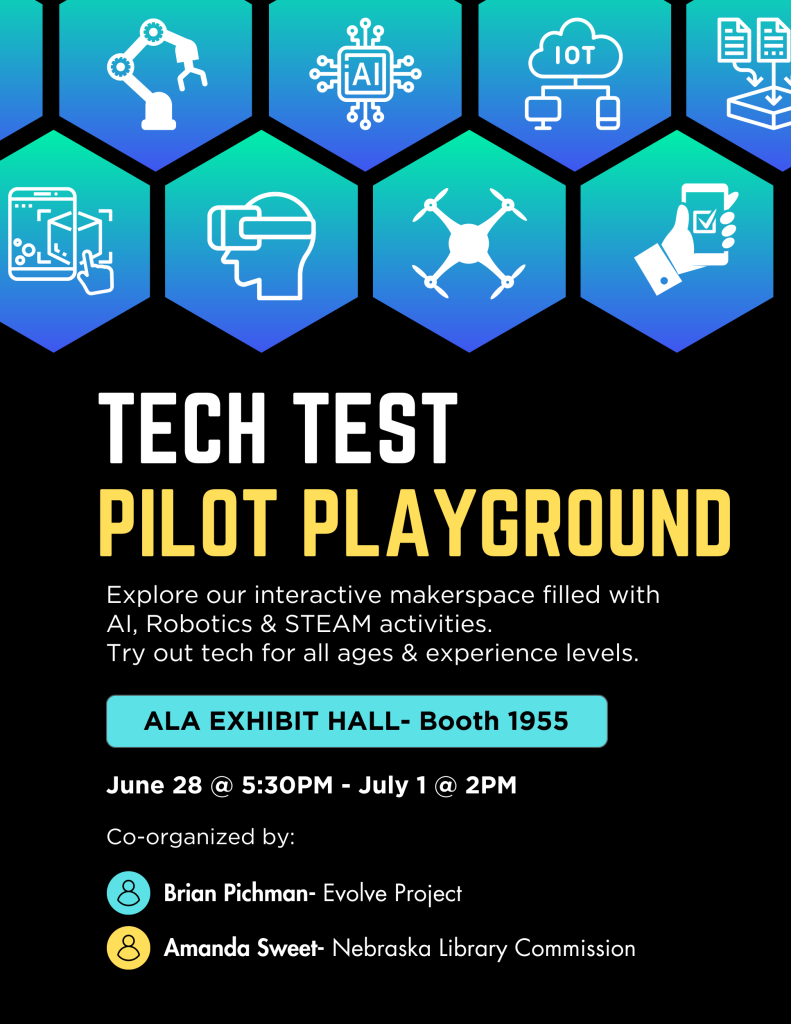
NCompass Live: Pretty Sweet Tech: Geocaching Summer Adventures: Librarians Gone Wild
Dig into the wonderful world of geocaching to send kids, teens and adults on treasure hunts on next week’s NCompass Live webinar on Wednesday, June 26 at 10am CT.
Special monthly episodes of NCompass Live! Join the NLC’s Technology Innovation Librarian, Amanda Sweet, as she guides us through the world of library-related Pretty Sweet Tech.
This session will help you dig into the wonderful world of geocaching to send kids, teens and adults on treasure hunts! You don’t even have to hide the things yourself because the Geocaching community has already hidden little trinkets and treasures all over the world. Though you can add more stuff to the shared treasure map if you’re so inclined.
Learn how to leverage existing resources to get a geocaching adventure up and running for free or low cost using geocaching.com and the associated app on your smartphone, with the option to go all out and build a custom, themed geocaching adventure for your community. By the end of this session you will have:
- Guide to set up geocaching adventures for all ages
- Complementary summer reading, STEM & STEAM activities for kids
- Complementary material displays, STEM & STEAM activities for teens & adults
- Known geocaching trails across Nebraska & beyond
While the examples are from Nebraska, geocaching adventures are for everyone, everywhere!
Upcoming NCompass Live shows:
- July 3 – Helping Students Be Google Aware
- July 17 – Think Outside the Box: Transformative Training with Breakout Challenges
- Aug. 14 – Operating a Culture of Belonging: Personal Librarian 2.0
To register for an NCompass Live show, or to listen to recordings of past shows, go to the NCompass Live webpage.
NCompass Live is broadcast live every Wednesday from 10am – 11am Central Time. Convert to your time zone on the Official U.S. Time website.
The show is presented online using the GoTo Webinar online meeting service. Before you attend a session, please see the NLC Online Sessions webpage for detailed information about GoTo Webinar, including system requirements, firewall permissions, and equipment requirements for computer speakers and microphones.
Posted in Education & Training, Pretty Sweet Tech, Programming
Tagged NCompLive, prettysweettech
Leave a comment
United for Libraries Virtual 2024: Statewide Registration
2024 United for Libraries Virtual: Trustees, Friends, Foundations
Tuesday July 30 – Thursday, August 1
Congratulations! The Nebraska Library Commission has purchased statewide registration! All library directors/staff, Trustees/board members, and Friends of the Library and Foundation representatives receive FREE live registration and/or on-demand viewing – a value of $149 per person.
Registration includes live attendance and on-demand access to three full days of programming, keynote featuring author Eric Klinenberg, and the virtual Gala Author Tea. Individuals may attend any/all sessions live and/or watch on-demand.
This interactive three-day virtual event will feature expert speakers on current topics facing library Trustees, Friends, Foundations, and staff who work with them.
- Participate in live Q&A sessions with presenters
- Enjoy exclusive access to keynote speakers and authors
- Receive a certificate of attendance (for live participation or on-demand viewing)
Programming runs from 10:00 am CST to approximately 3:00 pm CST daily with scheduled breaks. Registrants may participate in some or all program sessions live, and/or watch recordings on-demand.
Sessions include:
Tuesday, July 30th – Trustee Day
- “Rising to the Challenge: The Trustee’s Role in the ‘Culture Wars'”
- “Securing Tomorrow: Effective Succession Strategies for Library Boards”
- “Valuing Your Library: Beyond Cost-Benefit Analysis”
Wednesday, July 31st – Foundations & Fundraising Day
- “Donor Engagement: Acquiring and Inspiring Committed and Faithful Supporters”
- “Enhancing the Story – Developing a Smaller-Scale Capital Projects Fundraising Campaign”
- “Fundraising Tips and Tricks: Some Novel Ideas”
- “Marketing is the Future: How to Build a More Sustainable Library Foundation Model by Integrating Marketing in the Organizational Culture, Strategy, and Practice”
Thursday, August 1st – Friends Day
- “An Extravaganza of Literary Events for Your Library”
- “Championing Library Freedom: How Friends Groups Can Fight Back When Our Library is Under Attack”
- “Libraries are Better with Friends: How to Foster a Strong Group of Advocates”
- “Smooth Sailing with Library Trustees and Staff”
Registration Options
Choose *one* of the following options below to register for the virtual conference:
- ALA eLearning Website
- Nebraska Statewide Group Membership Course
- You will be prompted to login, if not already logged in.
- Statewide Free Registration Form
- Submit the Statewide Free Registration Form
- Allow one business day for registration.
- Email United for Libraries
- Email united@ala.org
- Include your full name, email address, library, and primary library role
- Allow one business day for registration
- Bulk Registration
- Library Directors may email united@ala.org
- Include full names, email addresses, and primary library roles for each individual to register
- Allow two business days for registration.
If you have any questions, please contact Holli Duggan.
Public Library Accreditation 2024 Workshop Recording now available
The recording of the Nebraska Library Commission’s ‘Public Library Accreditation 2024’ online workshop is now available on the Accreditation webpage.
The purpose of Nebraska Public Library Accreditation is to encourage excellent library service in Nebraska communities. The guidelines used to evaluate libraries and their services are community-based, so libraries need to know their communities’ needs in order to provide appropriate library services that meet those unique needs. That’s where Community Needs Response Planning comes in!
In this workshop, Christa Porter, NLC’s Library Development Director, will answer all of your accreditation questions, such as:
- What is Nebraska Public Library Accreditation?
- What are the benefits of accreditation?
- How does my library become accredited?
- What’s a Community Needs Response Plan? And why does my library need one?
Public Library Directors, Staff, and Library Board Members are encouraged to attend.
If you have any questions or need any assistance with your Accreditation or Community Needs Planning, please contact Christa Porter, 800-307-2665, 402-471-3107.
ARSL 2024 Early Bird Conference Registration is NOW OPEN!
Registration for both in-person and virtual attendance at the 2024 Association for Rural & Small Libraries Conference is open!
The in-person 2024 ARSL Conference will be held at the MassMutual Center, Springfield, Massachusetts, from September 11-14, 2024.
This year’s conference theme is “Libraries are (r)Evolutionary.” Our conference provides an opportunity to explore the transformative power of rural and small libraries in our communities. Like chrysalises of change, these libraries nurture revolutionary ideas and evolve to meet the ever-changing needs of our patrons. Let’s embrace the (r)Evolutionary spirit of libraries and inspire each other.
Early Bird pricing for in-person attendance will be available through July 16.
For more information about the conference and to register, visit the 2024 Conference Homepage.
ARSL Member Rates
- Base Conference Attendance
Early Bird – $295
Regular – $380
On-site – $380 + $25 admin fee - Preconference Workshops**
3-Hour Workshops – $60
4-Hour Workshops – $75
7-Hour Workshop – $160 - Virtual Attendance
$55
Student, Advocate & Retiree Rates*
- Base Conference Attendance
Early Bird – $250
Regular – $290
On-site – $290 + $25 admin fee - Preconference Workshops**
3-Hour Workshops – $60
4-Hour Workshops – $75
7-Hour Workshop – $160 - Virtual Attendance
$30
Nonmember Rates
- Base Conference Attendance
Early Bird – $390
Regular – $460
On-site – $460 + $25 admin fee - Preconference Workshops**
3-Hour Workshops – $85
4-Hour Workshops – $100
7-Hour Workshop – $205 - Virtual Attendance
$80
*Must be an ARSL Advocate, Student, or Retiree member. **Preconference Workshop fees are charged in addition to Base Conference Registration and are available for in-person conference attendees only.
NCompass Live: Pretty Sweet Tech: Responsive WordPress Layouts in Elementor
Do you have some WordPress layouts that work really well on desktop but squish into unrecognizable chaos on smaller screens? Learn how to set up responsive layouts using Elementor on next week’s NCompass Live webinar on Wednesday, May 29 at 10am CT.
Special monthly episodes of NCompass Live! Join the NLC’s Technology Innovation Librarian, Amanda Sweet, as she guides us through the world of library-related Pretty Sweet Tech.
In this session I will show you how to set up responsive layouts that display one way on larger screens and another way on smaller screens. This can be difficult with the built-in Gutenberg editor, so we’re going to use Elementor. Here’s what I’ll cover:
- Responsive website best practices
- Elementor settings for responsive layouts
- Layout examples:
- Displaying or hiding different images based on screen size
- Gallery views on different screen sizes
- Tips for saving images that display well on all screen sizes
- Displaying calendar view vs. list view based on screen size
I will also open it up to requests if there are specific things you’re running into. It’s time to get responsive!
Upcoming NCompass Live shows:
- June 19 – NO NCOMPASS LIVE
- June 26 – Pretty Sweet Tech
- July 3 – Helping Students Be Google Aware
- July 17 – Think Outside the Box: Transformative Training with Breakout Challenges
To register for an NCompass Live show, or to listen to recordings of past shows, go to the NCompass Live webpage.
NCompass Live is broadcast live every Wednesday from 10am – 11am Central Time. Convert to your time zone on the Official U.S. Time website.
The show is presented online using the GoTo Webinar online meeting service. Before you attend a session, please see the NLC Online Sessions webpage for detailed information about GoTo Webinar, including system requirements, firewall permissions, and equipment requirements for computer speakers and microphones.
NCompass Live: Fostering Nature’s Love: Collaborating with Local Author for Community Engagement
Join us on this week’s NCompass Live on Wednesday, May 22 at 10am CT, for ‘Fostering Nature’s Love: Collaborating with Local Author for Community Engagement’.
Friends of the Verde River has introduced its first children’s book, “On the Verde River,” authored by Arizona native Phoebe Fox and illustrated by Jim Fox. This book aims to inspire a love for nature among children aged 2 to 10. As part of our nonprofit’s efforts for Arizona Gives Day, we partnered with Verde Valley First Books to distribute copies of the book to children in need across the Verde Valley. Verde Valley First Books is another nonprofit that is dedicated to providing age-appropriate books to 3 and 4-year-olds living in poverty, currently serving 554 children monthly.
Our outreach includes collaborations with local libraries, participating in story times with activities like making paper otters, and featuring the book in Sunset Park’s StoryWalk in Sedona. Additionally, “On the Verde River” has been recognized by the Library of Congress’ Center for the Book, being listed among “Great Reads from Great Places” and will be showcased at the National Book Festival in Washington, D.C. on August 24, 2024. This recognition enhances the book’s reach and impact, promoting nature appreciation among young readers.
Presenters: Katherine Sirimarco, Fundraising and Communications Coordinator, Friends of the Verde River and Phoebe Fox, Children’s Book Author.
To register for an NCompass Live show, or to listen to recordings of past shows, go to the NCompass Live webpage.
NCompass Live is broadcast live every Wednesday from 10am – 11am Central Time. Convert to your time zone on the Official U.S. Time website.
The show is presented online using the GoTo Webinar online meeting service. Before you attend a session, please see the NLC Online Sessions webpage for detailed information about GoTo Webinar, including system requirements, firewall permissions, and equipment requirements for computer speakers and microphones.
CCC Library Information Services Classes for Fall 2024

Central Community College announces class for the Library Information Services program for Fall 2024.
Enrollment opened April 19, 2024 for classes beginning August 19, 2024. The Library & Information Services Certificate is a 15-credit hour program. All credits can be applied to a Central Community College associate degree.
See details of classes and registration information at https://www.cccneb.edu/lis
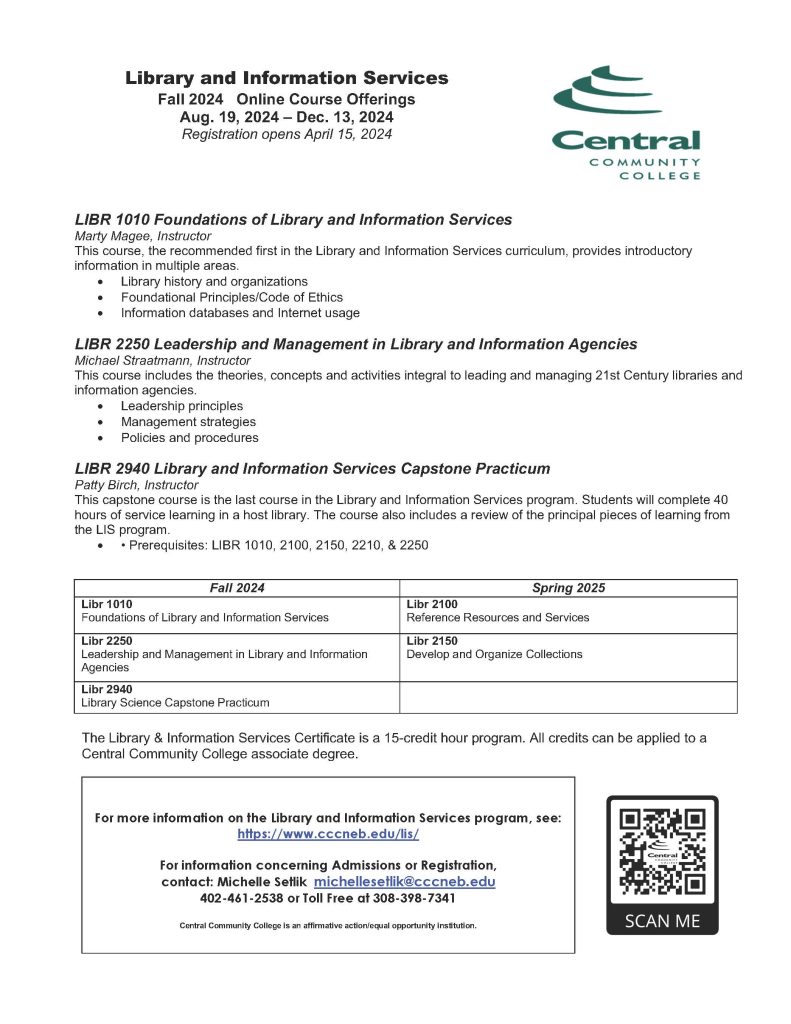
Public Library Accreditation 2024 Workshops Scheduled
‘Public Library Accreditation 2024’ workshops are now open for registration! All workshops will be held online only, via GoTo Webinar. To register for a session, go to the Nebraska Library Commission’s Training & Events Calendar and search for ‘accreditation 2024’.
NOTE: The online workshop is being offered on several days and at varied times, to give attendees multiple opportunities to find a convenient time to attend. The same information will be provided at each workshop, so you only need to register for one session. A recorded version will also be made available after all of the live sessions have been held.
The purpose of Nebraska Public Library Accreditation is to encourage excellent library service in Nebraska communities. The guidelines used to evaluate libraries and their services are community-based, so libraries need to know their communities’ needs in order to provide appropriate library services that meet those unique needs. That’s where Community Needs Response Planning comes in!
In this workshop, Christa Porter, NLC’s Library Development Director, will answer all of your accreditation questions, such as:
- What is Nebraska Public Library Accreditation?
- What are the benefits of accreditation?
- How does my library become accredited?
- What’s a Community Needs Response Plan? And why does my library need one?
Public Library Directors, Staff, and Library Board Members are encouraged to attend.
Dates and times:
- June 4 – 1:00-4:00pm Central / 12:00noon-3pm Mountain
- June 6 – 9:30am-12:30pm Central / 8:30-11:30am Mountain
- June 11– 9:30am-12:30pm Central / 8:30-11:30am Mountain
- June 12 – 1:00-4:00pm Central / 12:00noon-3pm Mountain
To register for a session, go to the Nebraska Library Commission’s Training & Events Calendar and search for ‘accreditation 2024’.
NCompass Live: The 2024 Public Library Accreditation Process
Get a head start on ‘The 2024 Public Library Accreditation Process’ on next week’s NCompass Live webinar on Wednesday, May 8 at 10am CT.
The 2024 Nebraska Public Library Accreditation process opens on July 1. If your library is up for re-accreditation this year, join us for a short refresher on the process. Or, if your library is not currently Accredited, attend this session to explore the possibility of becoming an Accredited Public Library. In this general overview, you will learn why Accreditation is important and what it can do for your library. We’ll also show you the Application Form, and explain how it relates to the required Community Needs Response Plan. Public Library Directors, Staff, and Library Board Members are encouraged to attend.
Presenter: Christa Porter, Library Development Director, Nebraska Library Commission.
To register for an NCompass Live show, or to listen to recordings of past shows, go to the NCompass Live webpage.
NCompass Live is broadcast live every Wednesday from 10am – 11am Central Time. Convert to your time zone on the Official U.S. Time website.
The show is presented online using the GoTo Webinar online meeting service. Before you attend a session, please see the NLC Online Sessions webpage for detailed information about GoTo Webinar, including system requirements, firewall permissions, and equipment requirements for computer speakers and microphones.
